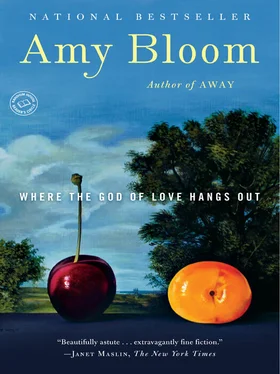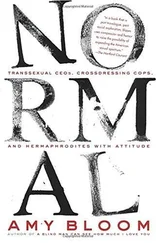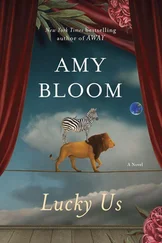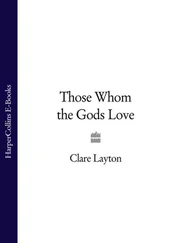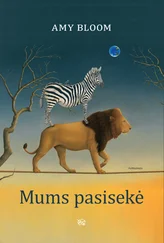Clare called Isabel about once a week, after watching Widow’s Walk , the most repulsive and irresistible show she’d ever seen. Three, sometimes four women sat around and said things like, “It’s not an ending; it’s a beginning.” What made it bearable to Clare was that the women were all ardent Catholics and not like her, except the discussion leader, who was so obviously Jewish and from the Bronx that Clare had to Google her and discover that she had a Ph.D. in philosophical something and converted to Catholicism after a personal tragedy. Clare got to hear a woman who sounded a lot like her great-aunt Frieda say, “I pray for all widows, and we must all keep on with our faith and never forget that Jesus meets every need.” Clare waited for the punch line, for the woman to yank her cross off her neck and say, “And if you believe that, bubbeleh , I’ve got a bridge I’d like to sell you,” but she never did. She did sometimes say, in the testing, poking tone of a good rabbi, “Isn’t it interesting that so many women saints came to their sainthood through being widows? They were poor and desperate, alone in the world with no protection, but the sisters took them in and even educated their children. Isn’t it interesting that widowhood led them to become saints and extraordinary women, to know themselves and Jesus better?” The other widows, the real Catholics, didn’t look interested at all. The good-looking one, in a red suit and red high heels, kept reminding everyone that she was very recently widowed (and young, and pretty) and the other two, a garden gnome in baggy pants and black sneakers that didn’t touch the floor and a tall woman in a frilly blouse with her glasses taped together at the bridge, talked, in genuinely heartbroken tones, about their lives now that they were alone. They rarely mentioned their husbands, although the gnome did say, more than once, that if she could forgive her late husband, anyone could forgive anyone.
Clare dials, as soon as the organ music dies down, and Isabel picks up after one ring. Clare doesn’t speak.
“Clare?”
Clare sighs. Hanging up was bad enough.
“Isabel.”
Isabel sighs as well.
“I saw Emily a few weeks ago. I dropped off a birthday present for baby Charlotte. She’s beautiful. Emily seems very happy. I mean, not to see me, but in general.”
“Yes, she told me.”
“I shouldn’t have gone.”
“Well. If you want to offer a relationship and generous gifts, it’s up to Emily. Kurt’s mother’s dead. I guess it depends on how many grandmothers Emily wants Charlotte to have, regardless of who they are.” There was no one like Isabel.
“I guess it does. I mean, I’m not going to presume. I’m not going to drop in all the time with a box of rugelach and a hand-knit sweater.”
“I wouldn’t think so. Clare—”
“Oh, Isabel, I miss you.”
“Good night, Clare.”
When Clare gets off the phone, there’s a raccoon in her kitchen, on the counter. It, although Clare immediately thinks He, is eating a slice of bacon bread. He’s holding it in his small, nimble, and very human black hands. He looks at her over the edge of the bread, like a man peering over his glasses. A fat, bold, imperturbable man with a twinkle in his dark eyes.
Even though she knows better, even though William would have been very annoyed at her for doing so, Clare says, softly, “William.”
The raccoon doesn’t answer and Clare smiles. She wouldn’t have wanted the raccoon to say, “Clare.” Because then she would have had to call her boys and have herself committed, and although this is not the life she hoped to have, it’s certainly better than being in a psychiatric hospital. The raccoon has started on his second slice of bacon bread. Clare would like to put out the orange marmalade and a little plate of honey. William never ate peanut butter, but Clare wants to open a jar for the raccoon. She’s read that they love peanut butter, and she doesn’t want him to leave.
In an ideal world, the raccoon would give Clare advice. He would speak to her like Quan Yin, the Buddhist goddess of compassion and mercy. Or he would speak to her like Saint Paula, the patron saint of widows, about whom Clare has heard so much lately.
Clare says, without moving, “And why is Saint Paula a saint? She dumps her four kids at a convent, after the youngest dies. She runs off to hajira with Saint Jerome. How is that a saint? You’ve got shitty mothers all over America who would love to dump their kids and travel.”
The raccoon nibbles at the crust.
“Oh, it’s very hard,” Clare says, sitting down slowly and not too close. “Oh, I miss him so much. I didn’t know. I didn’t know that I would be like this, that this is what happens when you love someone like that. I had no idea. No one says, There’s no happy ending at all. No one says, If you could look ahead, you might want to stop now. I know, I know, I know I was lucky. I was luckier than anyone to have had what I had. I know now. I do, really.”
The raccoon picks up two large crumbs and tosses them into his mouth. He scans the counter and the canisters and looks closely at Clare. He hops down from the counter to the kitchen stool and onto the floor and strolls out the kitchen door.
* * *
Clare told Nelson about the raccoon and they encouraged him with heels of bread and plastic containers of peanut butter leading up the kitchen steps, but he didn’t come back. She told Margaret Slater, who said she was lucky not to have gotten rabies, and she told Adam and Danny, who said the same thing. She bought a stuffed-animal raccoon with round black velvet paws much nicer than the actual raccoon’s, and she put him on her bed with the rhino and the little bird and William’s big pillows. She told little Charlotte raccoon stories when she came to babysit (how could Emily say no to a babysitter six blocks away and free and generous with her time?). She even told Emily, who paused and said, with a little concern, that raccoons could be very dangerous.
“I don’t know if you heard,” Emily said. “My mother’s getting married. A wonderful man.”
Clare bounced Charlotte on her knee. “Oh, good. Then everyone is happy.”
Opening the Hands Between Here and Here
On the dark road, only the weight of the rope. Yet the horse is there.
— JANE HIRSHFIELD

I had always planned to kill my father. When I was ten, I drew a picture of a grave with ALVIN LOWALD written on the tombstone, on the wall behind my dresser. From time to time, I would add a spray of weeds or a creeping vine. By the time I was in junior high, there were trees hung with kudzu, cracks in the granite, and a few dark daisies springing up. Once, when my mother wouldn’t let me ride my bike into town, I wrote, Peggy Lowald is a fat stupid cow behind the dresser but I went back the same day and scribbled over it with black Magic Marker because most of the time I did love my mother and I knew she loved me. The whole family knew that my mother’s feelings were Sensitive and Easily Hurt. My father said so, all the time. My father’s feelings were also sensitive, but not in a way that I understood the word, at ten; it might be more accurate to say that he was extremely responsive. My brother, Andy, drew cartoon weather maps of my father’s feelings: dark clouds of I Hate You, giving way to the sleet of Who Are You, pierced by bolts of Black Rage.
Читать дальше
